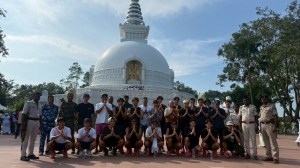A shattered village gets to know what self-Reliance can do
ANJAR, FEBRAUARY 5: The pale yellow of sodium vapour lights flood Anjar at night. Men and machines work round-the-clock to clear the remai...

ANJAR, FEBRAUARY 5: The pale yellow of sodium vapour lights flood Anjar at night. Men and machines work round-the-clock to clear the remains of the quake.
The day after the quake, it seemed they would take at least three months to clear the debris. But the town will be ready for rebuilding in the next 15 days. The success of a corporate like Reliance which adopted the town could well announce the beginning of a new trend in disaster management in India.
News from the Epicentre
» Full coverage of the Gujarat earthquake
» Donate online for relief
Headed by the commercial head of its Jamnagar plant, V.K. Gandhi, nearly 100 people landed in Anjar with 273 pieces of heavy equipment. “We already had these things. It was only a question of mobilising them,” said Gandhi.They set up four camps in Anjar and ensured that they were self-sufficient — they even had brought mobile toilets.
The team was divided into three sections — debris removal, medical services and food and shelter. The expertise ranged from chartered accountants, doctors, engineers, human resources professionals, construction experts and heavy machinery experts from Reliance.
The task was carefully studied with the help of detailed survey sheets and daily reports. The entire city was divided into zones and nine out of 10 zones were to be handled by them. As many as 5,500 running metres of road (the length as opposed to the distance) were to be cleared.
Principles of management came in handy for the entire team as they are treating this operation as nothing less than a project. “We had to ensure that key areas were identified. For example, if we cleared one of the main lanes, it would help in building public confidence,” said Gandhi.
A tough but realistic time schedule was fixed. “If we had said two months, even the government would have been able to do it,” he said.
The third strategy which came in handy was the back-and-forth monitoring. If JCBs are not working out, cranes are to be brought in, and if that fails then bullock carts have to be used. “Quick change in strategy is important. In the small lanes where the big dumpers cannot go in, we are using camel carts,” said a senior Reliance official.
The same ideas were used as far as medical facilities were concerned. “We decided that our priority was saving life and limb,” said Col. S.K.P Matwankar, heading the medical team. When they evacuated 17 casualties to Patalganaga, they sent the same nurse attending that patient and one relative each with them. “We ensured that the tie-up with the Air Force was done in such a way that the patients would not be left lying in the sun,” said a member of the medical team.
Teamwork came into play on a number of occasions. “When we were told by other NGOs in the area that they were running out of oxygen cylinders, we airlifted 75 of them in a matter of hours,” said Col. Matwankar.
They also had to fulfill unexpected requests like flying in anti-rabies injections as there had been a large number of dog-bite cases after the earthquake since stray animals had nothing to eat.
As far as food and shelter were concerned, they made four teams which they sent out to 67 villages with a survey form which would give the exact requirement of the people there. “The minute we got to know that it was tents, we immediately gave orders to our units in Ahmedabad, Surat and Mumbai to make 10,000 of these,” said Gandhi.
Reliance, they say, has honed its skills in relief management over the years by fighting a number of natural calamities like the plague, cyclone and drought every year in the Kutch region. Though Neeta Ambani has already visited the operation site, they are expecting the two brothers — Mukesh and Anil — any day now to boost their morale.
Photos





- 01
- 02
- 03
- 04
- 05

























